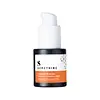What's inside
What's inside
 Key Ingredients
Key Ingredients

 Benefits
Benefits

 Concerns
Concerns

No concerns
 Ingredients Side-by-side
Ingredients Side-by-side

Water
Skin ConditioningAscorbic Acid 13%
AntioxidantButylene Glycol
HumectantDipropylene Glycol
HumectantTromethamine
Buffering3-O-Ethyl Ascorbic Acid
Skin ConditioningPanthenol
Skin ConditioningAcetyl Glucosamine
Skin ConditioningCaffeine
Skin ConditioningSodium Hyaluronate
HumectantSodium Sulfite
PreservativeDisodium EDTA
Glutathione
Adenosine
Skin ConditioningGardenia Florida Fruit Extract
Skin ConditioningAllantoin
Skin ConditioningDextrin
AbsorbentSqualane
EmollientTocotrienols
Skin ConditioningTocopherol
AntioxidantElaeis Guineensis Oil
EmollientArginine
MaskingNiacinamide
SmoothingPentylene Glycol
Skin ConditioningGlycyrrhiza Glabra Root Extract
BleachingWater, Ascorbic Acid 13%, Butylene Glycol, Dipropylene Glycol, Tromethamine, 3-O-Ethyl Ascorbic Acid, Panthenol, Acetyl Glucosamine, Caffeine, Sodium Hyaluronate, Sodium Sulfite, Disodium EDTA, Glutathione, Adenosine, Gardenia Florida Fruit Extract, Allantoin, Dextrin, Squalane, Tocotrienols, Tocopherol, Elaeis Guineensis Oil, Arginine, Niacinamide, Pentylene Glycol, Glycyrrhiza Glabra Root Extract
Citrus Limon Fruit Extract
MaskingGlycerin
HumectantButylene Glycol
Humectant3-O-Ethyl Ascorbic Acid
Skin ConditioningMethylpropanediol
SolventAcetyl Glucosamine
Skin ConditioningPentylene Glycol
Skin Conditioning1,2-Hexanediol
Skin ConditioningFerulic Acid
AntimicrobialAmmonium Acryloyldimethyltaurate/Vp Copolymer
Caprylyl Glycol
EmollientSodium Hydroxide
BufferingXanthan Gum
EmulsifyingEthylhexylglycerin
Skin ConditioningSodium Phytate
Tocopherol
AntioxidantCitrus Limon Fruit Extract, Glycerin, Butylene Glycol, 3-O-Ethyl Ascorbic Acid, Methylpropanediol, Acetyl Glucosamine, Pentylene Glycol, 1,2-Hexanediol, Ferulic Acid, Ammonium Acryloyldimethyltaurate/Vp Copolymer, Caprylyl Glycol, Sodium Hydroxide, Xanthan Gum, Ethylhexylglycerin, Sodium Phytate, Tocopherol
Ingredients Explained
These ingredients are found in both products.
Ingredients higher up in an ingredient list are typically present in a larger amount.
You might know this ingredient as Ethyl Ascorbic Acid, a more stable version of ascorbic acid.
Like other types of vitamin C, this ingredient has many benefits including reducing wrinkles, skin soothing, dark spot fading, and fighting against free radicals.
3-O-Ethyl Ascorbic Acid interferes with the process of skin darkening, helping to reduce hyperpigmentation. It also encourages the skin to produce more collagen.
Once applied, 3-O-Ethyl Ascorbic Acid is converted to Vitamin C deeper in the skin's layers. This process is slow but makes this ingredient more tolerable for skin.
The optimum pH range for this ingredient is 4 - 5.5
Learn more about 3-O-Ethyl Ascorbic AcidAcetyl Glucosamine is an antioxidant and humectant. It is an amino acid sugar and is naturally found in our skin.
The cool thing about this ingredient? It helps the skin produce hyaluronic acid and boost hydration. It also has antioxidant benefits to protect skin cells.
When paired with niacinamide, Acetyl Glucosamine has been shown to be effective at reducing discoloration.
Learn more about Acetyl GlucosamineButylene Glycol (or BG) is used within cosmetic products for a few different reasons:
Overall, Butylene Glycol is a safe and well-rounded ingredient that works well with other ingredients.
Though this ingredient works well with most skin types, some people with sensitive skin may experience a reaction such as allergic rashes, closed comedones, or itchiness.
Learn more about Butylene GlycolPentylene glycol is typically used within a product to thicken it. It also adds a smooth, soft, and moisturizing feel to the product. It is naturally found in plants such as sugar beets.
The hydrophilic trait of Pentylene Glycol makes it a humectant. As a humectant, Pentylene Glycol helps draw moisture from the air to your skin. This can help keep your skin hydrated.
This property also makes Pentylene Glycol a great texture enhancer. It can also help thicken or stabilize a product.
Pentylene Glycol also acts as a mild preservative and helps to keep a product microbe-free.
Some people may experience mild eye and skin irritation from Pentylene Glycol. We always recommend speaking with a professional about using this ingredient in your routine.
Pentylene Glycol has a low molecular weight and is part of the 1,2-glycol family.
Learn more about Pentylene GlycolTocopherol (also known as Vitamin E) is a common antioxidant used to help protect the skin from free-radicals and strengthen the skin barrier. It's also fat soluble - this means our skin is great at absorbing it.
Vitamin E also helps keep your natural skin lipids healthy. Your lipid skin barrier naturally consists of lipids, ceramides, and fatty acids. Vitamin E offers extra protection for your skin’s lipid barrier, keeping your skin healthy and nourished.
Another benefit is a bit of UV protection. Vitamin E helps reduce the damage caused by UVB rays. (It should not replace your sunscreen). Combining it with Vitamin C can decrease sunburned cells and hyperpigmentation after UV exposure.
You might have noticed Vitamin E + C often paired together. This is because it is great at stabilizing Vitamin C. Using the two together helps increase the effectiveness of both ingredients.
There are often claims that Vitamin E can reduce/prevent scarring, but these claims haven't been confirmed by scientific research.
Learn more about Tocopherol